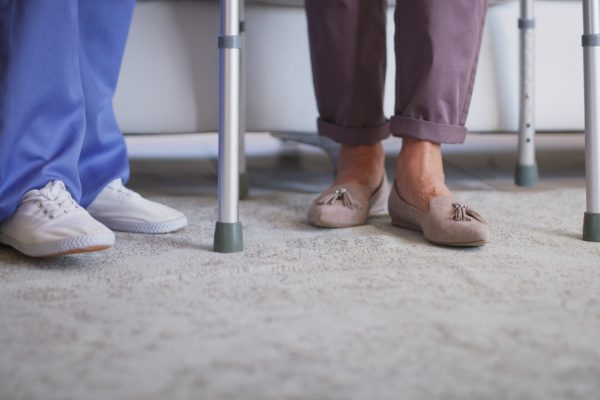Slips, trips, and falls (STFs) make up 66% of general injuries in the health care industry. According to the National Library of Medicine, falls among home health care workers result from several factors – most of which are modifiable. Risk factors for STFs include poor lighting, loose carpets, lack of safety lift equipment, and slippery floors and stairs; task-related factors (for example, transferring heavy items or persons); and personal factors

(for example, lower extremity weakness, poor grip strength, balance disorders, visual impairment, and rushing). Home health care workers and patients share many of these risk factors.
Identifying and resolving STF hazards in home health care should increase safety for employees and their patients. Following are tips to share with home health care providers to help mitigate slips, trips, and falls and foster a safe environment.
For Home Health Care Workers:
- Footwear: When appropriate, home health care workers should wear non-slip footwear with good traction to reduce the risk of slipping.
- Clear Pathways: Keep pathways clear of obstacles and clutter. Remove tripping hazards like rugs, cords, or low furniture.
- Good Lighting: Ensure the home is well lit, especially in hallways, staircases, and common areas. Hold handrails when going up and down the stairs.
- Regular Home Assessments: Conduct regular assessments of the patient’s home environment to identify and address potential hazards that could contribute to falls.
- Personal Protective Equipment (PPE): Use appropriate PPE, including slip-resistant gloves, if handling liquids or substances that may pose a slipping risk.
For Patients and Their Homes:
- Floor Surfaces: Choose non-slip flooring materials, especially in areas prone to moisture, like bathrooms and kitchens.
- Secure Rugs and Carpets: Use non-slip pads or double-sided tape to secure rugs and carpets to the floor to prevent tripping.
- Electrical: Keep electrical cords near walls and away from walking paths.
- Handrails and Grab Bars: Install handrails on staircases and grab bars near toilets and inside and outside the bathtub and shower to provide additional support for patients when moving around.
- Night Lights: Add night lights and light switches by the bed.
- In the Kitchen: Keep frequently used pots, pans, and kitchen utensils where they are easy to reach.
- Other Living Areas: Arrange furniture (especially low coffee tables) and other objects so they are not in the patient’s path.
- Home Modifications: Make necessary modifications to the home, such as installing ramps for wheelchairs.
- Medication Management: Ensure that patients are aware of the potential side effects of medications that could affect their balance and coordination.
- Regular Exercise: Encourage patients to engage in appropriate exercises to improve strength and balance, as this can reduce the risk of falls.
- Emergency Response Plan: Have a clear emergency response plan in place if a fall occurs. This includes knowing how to seek help and having necessary contact information readily available.
General Safety Measures:
- Education: Inform health care staff and patients about the importance of fall prevention and how to build a safe home environment. Train health care workers on safe lifting techniques and proper body mechanics to avoid strain and injuries.
- Documentation: Keep careful records of patient assessments, including any identified fall hazards and preventive interventions.
- Collaboration: Encourage collaboration among health care staff, patients, and their families to develop a comprehensive fall prevention strategy suited to the individual’s specific requirements.
About One80 Intermediaries/Manchester Specialty
Manchester Specialty, a division of One80 Intermediaries, provides comprehensive business insurance solutions for for home care, medical staffing, misc. medical facilities, and elder care organizations. Licensed to do business as a program administrator in all 50 states and D.C., our agent/broker partners and their Allied Health clients look to us for our expertise, broad product capability, and commitment to the market and the quality and stability of our insurance programs.
For more information call us at 1-802-472-1500 or visit Allied Health Care Firms – One80 Intermediaries.